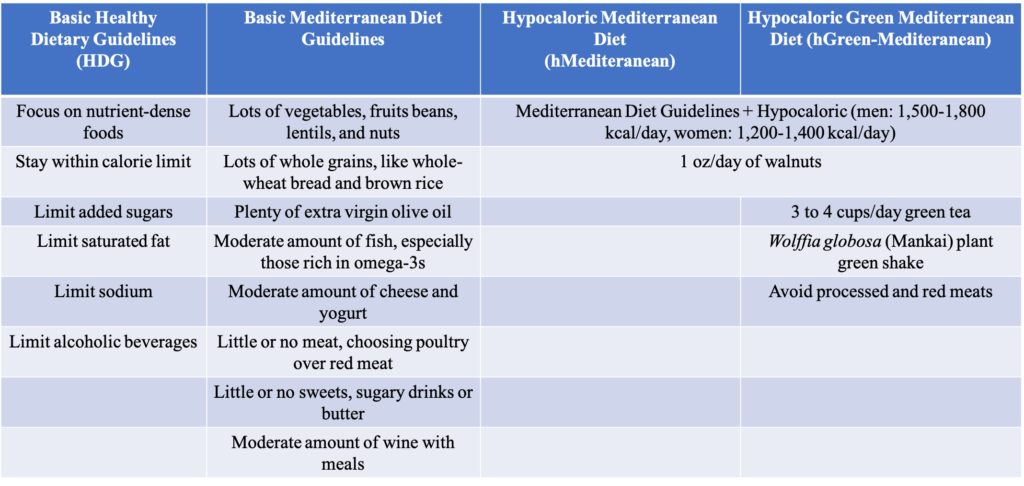Israeli Study Shows Three-Fold Improvement in Reducing Blood Vessel Hardening with New Green Mediterranean Diet
While the Mediterranean diet reduces artery stiffness in middle-aged adults with high abdominal fat, the Green Mediterranean reduces it further, indicating a potential reversal of cardiovascular aging.
Highlights:
- Combined with physical activity, the hypocaloric Green Mediterranean diet reduces artery stiffness by 15% while a standard healthy diet reduces it by 4.8%.
- The physical activity protocol includes aerobic, and resistance (weight lifting) exercises.
- The Green Mediterranean diet includes foods high in polyphenols — plant-based molecules encompassing senolytics like quercetin.
The hardening of our arteries — arterial stiffness — is a distinctive feature of aging and an early predictor of cardiovascular mortality risk. While exercise is known to increase the elasticity of our arteries, the effect of specific dietary interventions on artery hardening is not well studied. Now, for the first time, Israeli researchers show that dietary lifestyle interventions can reduce artery hardening.
Published in the Journal of the American College of Cardiology, Tsaban and colleagues assessed artery hardening in middle-aged adults with abdominal obesity by measuring proximal arterial stiffness (PAS). They found that when combined with physical activity, a standard healthy diet reduced PAS by 4.8% and the hypocaloric Mediterranean diet reduced PAS by 7.3%. Furthermore, the hypocaloric Green Mediterranean diet reduced PAS by 15%, three-fold more than the standard healthy diet.
“This study, to our knowledge, is the first to show that PAS might be regressed by maintaining a healthy lifestyle. Namely, and beyond weight loss, the [Green Mediterranean diet] may have greater influence on PAS regression, a predictor of lower risk of cardiovascular disease, compared with the [standard healthy] diet, which was marginally evident and compared with the [Mediterranean diet],” say the authors.
Mediterranean Diets Reduce Artery Hardening
Using MRI, Tsaban and colleagues precisely measured PAS both before and after an 18-month physical activity and dietary intervention protocol outlined below. Using statistical tools, PAS was adjusted for age, sex, change in weight, dysregulated fat metabolism (dyslipidemia), high blood pressure (hypertension), diabetes, and changes in blood pressure. Statistical techniques were also used to fill in data from 63 participants who dropped out of the study.
Before the 18-month intervention, it was found that increased PAS was associated with aging, hypertension, dyslipidemia, diabetes, and visceral adiposity — the fat surrounding our internal organs. After the 18-month intervention, all groups showed a reduction in PAS with the hypocaloric Green Mediterranean (hGreen-Mediterranean) diet showing a three-fold higher reduction than the standard healthy dietary guidlines (HDG) diet, and a more than 2-fold higher reduction than the hypocaloric Mediterranea (hMediterranean) diet.

Participants and Protocols
As part of the DIRECT-PLUS clinical trial, Tsaban and colleagues separated 294 middle-aged adults (averaging about 50-years-old) with abdominal obesity into three groups: a healthy dietary guidelines (HDG) diet group, a hypocaloric Mediterranean (hMediterranean) diet group, and a hypocaloric Green Mediterranean (hGreen-Mediteranean) diet group. All participants were given a free gym membership and instructed to engage in physical activity along with their given diet for 18 months.

As oppose to the HDG diet, both the hMediterranean and hGreen-Mediteranean diets were hypocaloric — low calories. Men consumed 1,500-1,800 kcal/day and women consumed 1,200-1,400 kcal/day. The hMediterranean diet included 1 oz/day of walnuts. The hGreen-Mediteranean diet further included 3 to 4 cups/day of green tea and a Wolffia globosa (Mankai) plant shake. The hGreen-Mediteranean diet group was also instructed to avoid processed and red meat. Other dietary components were not detailed in the study, but the basics of each are outlined below.

A previous study of the same DIRECT-PLUS clinical trial showed that both the hMediterranean and hGreen-Mediteranean diet reduced waist circumference and weight. Like PAS, the hGreen-Mediteranean diet reduced visceral adiposity by over 3-fold more than the HDG diet and 2-fold more than the hMediterranean diet. The Principal Investigator for both studies, Dr. Iris Shai says:
“A healthy lifestyle is a strong basis for improving cardiometabolic health. We learned from the results of our experiment that the quality of the diet is crucial for mobilizing atherogenic adipose tissues, lowering cardiometabolic risk, and improving one’s adiposity profile. Dietary polyphenols, substituting red meat with equivalent plant-based protein, show promise for improving various aspects of human health. However, to date, no dietary strategies have been shown to impact vascular aging physiology.”
The Magic of Polyphenols
The purpose of the modifications made to the traditional Mediterranean diet in this study was to increase the consumption of polyphenols — compounds found in plant-based foods. Walnuts contain the polyphenol ellagitannin, which has been reported to lower “bad” LDL cholesterol. Green tea contains polyphenols like epigallocatechin gallate (EGCG) and has been shown to improve cardiometabolic health. Wolffia globosa duckweed is an aquatic plant and serves as a source of protein, omega-3 fatty acids, fiber, vitamins (like B12), minerals (iron and zinc), and polyphenols like quercetin — an anti-aging-associated senolytic.
“Maintaining a healthy diet alone is associated with PAS regression. The green-Mediterranean diet provides a 15% dramatic reduction in PAS, which is gained by making simple and feasible changes to your diet and lifestyle. The results of our study highlight, once again, that not all diets provide similar benefits and that the green-Mediterranean diet may promote vascular health,” adds the lead author of the study, Gal Tsaban, MD, MPH.

